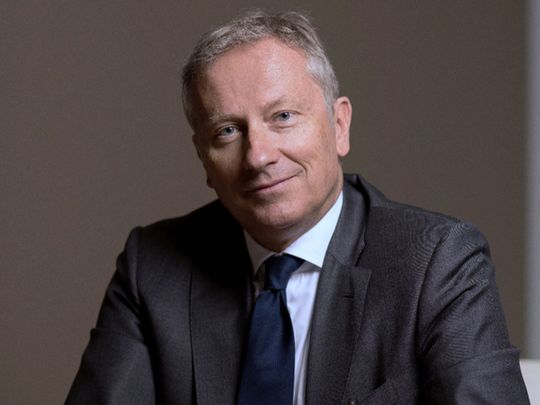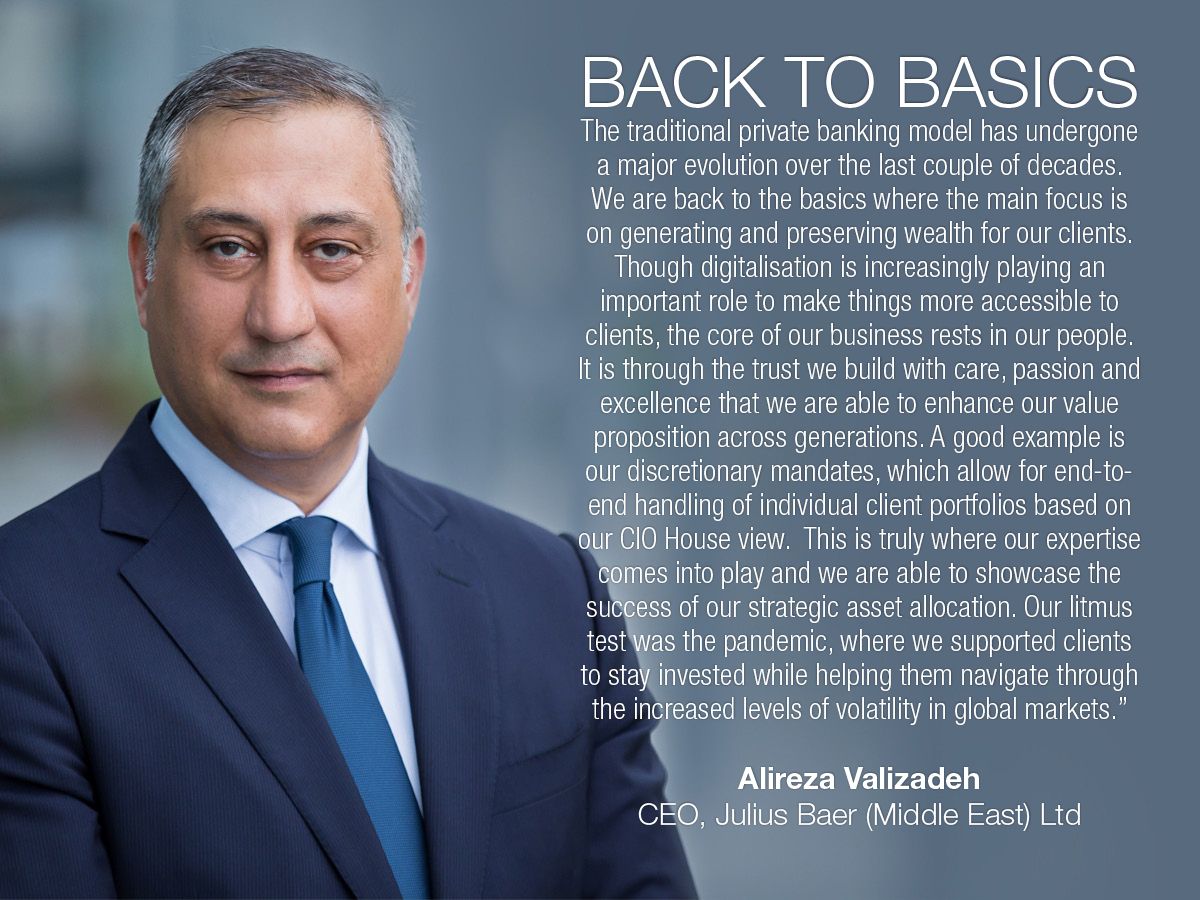
Highlights
- Yves Bonzon, Group Chief Investment Officer at Swiss Wealth Manager Julius Baer, talks to Gulf News on the secular trends that will define the next decade and how the pandemic continues to impact financial markets
You came out recently with the ‘Secular Outlook’ report defining the key themes for a decade. Did you see a major shift in trends from 2019 to 2020 impacting your outlook due to the pandemic?
The pandemic did not as much shift secular trends as it accelerated them, and substantially at that. Back when we first formulated the key themes for the 2020s in the fall of 2019, we hypothesised the end of the neo-liberal era was close, and envisioned a new unorthodox policy template, which relies less on purely monetary levers and places a greater importance on fiscal stimulus and debt monetisation, as suggested by proponents of Modern Monetary Theory (MMT).
The pandemic was the unexpected catalyst that prompted us to declare the neoliberal era definitely dead. The immediate policy response to the Covid-19 crisis was taken right out of that MMT policy toolbox – with governments rushing to implement massive stimulus programmes, backed by central banks annihilating rates to their lowest levels, while pumping liquidity to support asset prices. Recently the Federal Reserve Chairman, Jerome Powell, confirmed that the central bank will not even think about thinking of raising rates until they see the white in inflation’s eye. This is an extreme departure from the old policy paradigm.
However, that is not the end of the story. For the full transition to take place, more government stimulus and recurring budget deficits need to be widely accepted in Western economies, even outside times of crisis. We are definitely moving in that direction. Young voters, in contrast to their baby boomer and gen X predecessors, are much keener on the government playing a bigger role, especially when it comes to topics like education, fighting inequality, and climate change.
How has Covid-19 changed the way you look at strategic asset allocation?
The Strategic Asset Allocation (SAA) is the backbone of the investment process, and its role, both as the investor’s default position and as the driver of long-term investment returns has been reinforced during the pandemic. First, the sharp market decline in March 2020 and whiplash recovery that followed has once again made abundantly clear just how costly it is to flee to cash when turmoil shakes markets — investors are very unlikely to get back in at the right moment, and the financial consequences can be substantial. The SAA provides an anchor, an allocation investors can rely on in volatile times while staying invested. Second, going forward political forces are going to play a growing influence on markets, blurring traditional market signals. Government lockdowns have been one instance of this, but we have seen this trend become stronger already in previous years, for example via the Sino-American trade war, jerking markets up and down with every presidential tweet. In this environment, tactical moves are extremely hard to implement in a profitable way — increasing the importance of a sound SAA also over shorter time horizons.
As the CIO of Julius Baer, were you able to counter in the impact of an extraneous shock such as the virus and successfully able to manage client portfolios?
The Covid-19 pandemic is a particular case when it comes to external shocks, as it triggered, through government established lockdowns and physical distancing measures, a global economic downturn. The last time this happened was during the Second World War. So while its nature was exogenous, we were, and are continuing, to carefully monitor both the evolution of the pandemic and government responses, restrictive and supportive. In line with our investment approach, we stayed invested throughout the volatile environment in spring 2020, and once the waters calmed, added to risky assets that were to profit from the generous liquidity conditions guaranteed by central banks. This has turned out to be a rather successful strategy.

In the current situation, where we are waging a war against a global pandemic, how do you recommend investors should act with regard to their portfolio?
The initial vaccine euphoria that overtook markets in the fourth quarter of 2020 has died down. This is mostly due to challenges encountered in the deployment of vaccination programmes and the emergence of viral strains that might be more resistant to the currently available treatments. Nevertheless, progress is still being made and this reduces risks of prolonged lockdowns. An important factor to take into account is the fact that vaccines based on mRNA technologies can actually be quickly adapted, and we are talking in a matter of several weeks, to counter these mutant variants. So overall, with the global economy set to recover, we stay invested.
While looking at the next decade, what secular themes should investors focus on?
The next decade is all about the second wave of digitalisation – data and AI proliferating and disrupting all kinds of industries. One area that is being profoundly affected and has, in our view, substantial growth potential, is life sciences. mRNA is one example of a biotechnology that is revolutionising healthcare as we speak, but we are also seeing rapid innovation in screening technologies, as well as gene and cell therapy.
Another major theme, that is really more than a theme, it is a fundamental change to ‘traditional’ global asset allocation, is China. Chinese assets are rising to core asset class status. The Chinese economy is set to become the largest globally this decade and it will not be enough, going forward, for the global investor to monitor the US financial and economic cycle only. And if you want to have exposure to the new digital revolution, China is the place to be. Chinese companies are leading innovators, notably in the fintech space. Finally, you cannot dismiss the energy transition – electricity and cleantech will be everywhere, from singular vehicles to entire cities.
Narrowing down to 2021, what do you see are the major sectors that will reap the most benefits?
We are currently in a cyclical reflation phase, and sectors more severely hit by the pandemic are continuing to recover from what were very depressed levels. What’s quite interesting about the ‘market rotation’ triggered by the positive vaccine news is that it was the most ‘friendly’ rotation in history. “Covid winners” continued to trend upwards, or at least consolidated sideways, as “Covid losers” were catching up. We continue to see upside potential for both groups. Market fundamentals are sound, despite what the recent technical correction, triggered by retail investors coordinated buying of aggressively shorted stocks, would have some believe. Liquidity remains abundant and corporate earnings are robust, as demonstrated in the current earnings season. There is notably a huge pent up demand due the involuntary savings amassed by consumers during lockdowns, which should drive a boom in the services sector once released.
Finally, on a personal and professional level, how has the Covid-19 pandemic impacted you?
After 31 years in business, unexpected change of circumstances are an opportunity to reflect on the way I work and the way we manage the business together in the executive board of Julius Baer. For me, market dislocations are an opportunity to make a difference and demonstrate to our clients the value of a structured and time-tested investment process. During good times, it is sometimes not straightforward for clients to understand the value they get from doing business with true experts.




